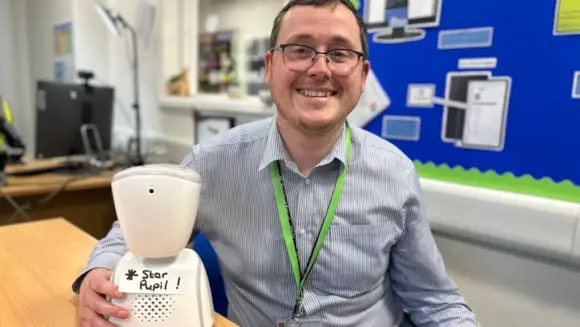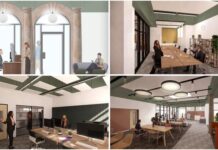AV1 robots are bridging the gap for pupils facing long-term absence
When children are undergoing long-term treatment or struggling with mental health issues, it isn’t just feeling unwell that can have a negative effect.
The separation from the classroom and friends can also take a toll, and this is a problem being addressed by the Kingsland School for pupils of secondary school age with complex needs.
At its Laurel Bank site in Shaw, for children and young people who cannot attend mainstream school because of medical needs, Kingsland is the proud home of three little robots who are changing the face of education at the school for those who can’t have home tuition or leave home because of mental or physical illness.
Developed by Norwegian company No Isolation, the AV1 telepresence robot takes the child’s place in the classroom and serves as their eyes, ears, and voice, maintaining a sense of belonging and helping them to stay connected with their classmates.
They can see everything that the robot can see through a small camera fitted on its head, and their real voice can be projected out into the classroom, or just to their friends by adjusting the volume, through the AV1’s speaker.
Expression in the AV1’s eyes can be changed to neutral, happy, sad or confused and their head flashes when the pupil wants to ask a question.
Teachers place them on a classroom desk while the student controls them remotely – and the robots have proven to be a ‘revolutionary’ move for Kingsland.
One of the biggest benefits is the ability to maintain social bonds to ease reintegration back in the classroom. One student requested that her robot could join her friends for lunch so she could chat to them and remain in their inner circle.
Sal Qureshi, head of the school’s Laurel Bank site, said about the robots: “We are the only school in Oldham to have these. It’s revolutionary and you can see that with the impact on our students.”
Referring to another students’ success story she said: “He wasn’t attending school at all and he wasn’t leaving the house.
“He finds it really anxiety inducing to leave the house and started 100 per cent on the AV1 robot.
“Now I’ve managed to get him to the library so he has some face to face tuition. We will aim to increase that because it’s always better than being at home.”
And Phil Pye, the teacher with responsibility for online learning and AV1, said: “One of the students wasn’t attending because of a medical need. With the robot her attendance is 99-per- cent, and that was a technical glitch and she came on in the afternoon. It wasn’t 100 per cent because of the glitch.
“With this particular child it has worked really well and we are looking at her transition back to school in Year 10.”
Students have six to eight-week placements with the robots initially, but depending on their needs they may keep it for longer.
One Laurel Bank pupil said: “I like it here because it’s small. There are about 30 pupils here.”
Another said: “I’ve been here since November and it’s better than mainstream. The classes are smaller and less rowdy than and there are not at here is lot more help if you need it.”
And another pupil said: “They support you with your mental health and there’s space to go to chill out and rest your mind.”If







